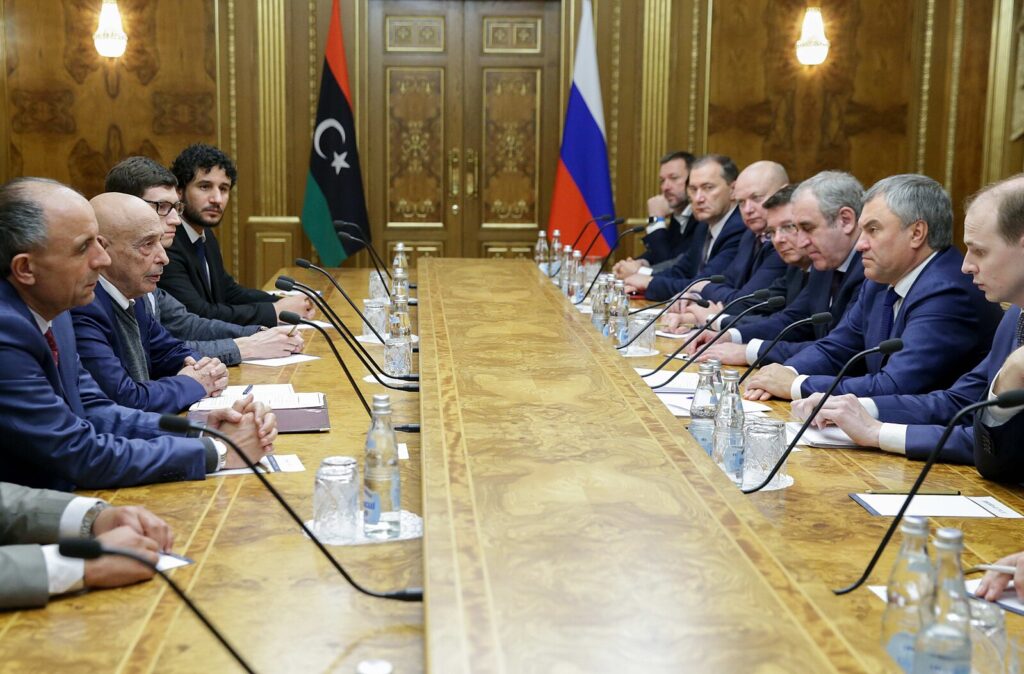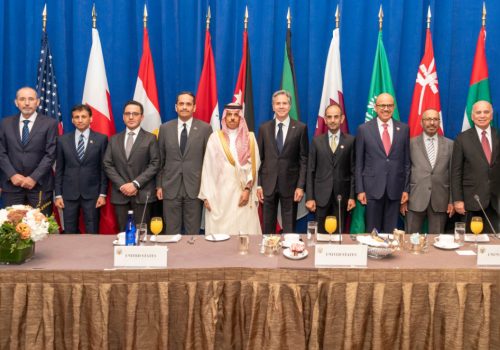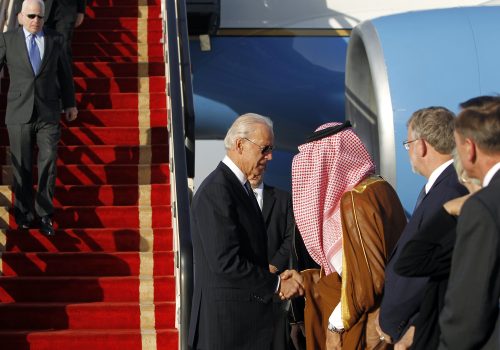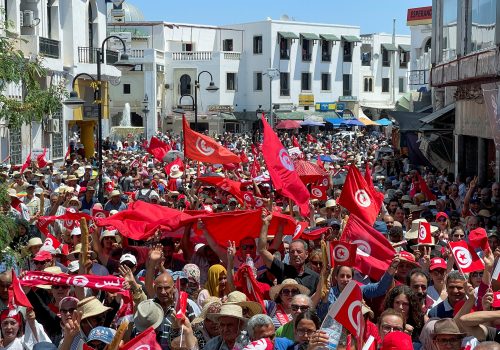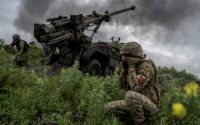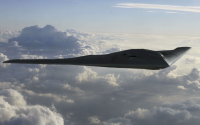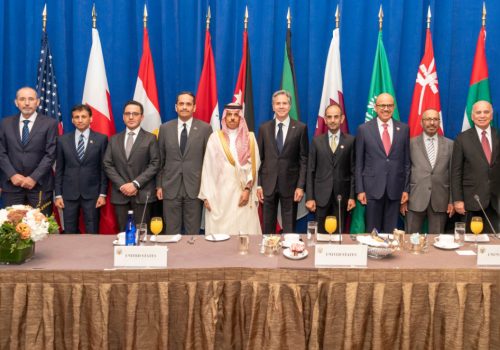
Libya is the crucial hub for Moscow’s activities in Africa
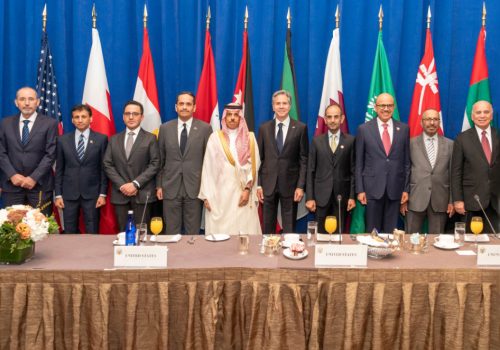
Over the past decade, Russia’s involvement in Libya is evidence of its realization that it could transition from a marginal power to a significant competitor in the country, and thus in the broader Middle East and North Africa. As Russia became disillusioned by its perception of the West’s actions in Libya as aimed at regime change, it shifted its stance from cooperative to antagonistic. This disillusionment strengthened Russia’s determination to establish a strong presence in the country, exemplified by its deployment of mercenaries to Libya to secure greater power and influence.
Russia’s withdrawal from the Middle East
Until the collapse of the Soviet Union and subsequent end to the Cold War, Russia maintained a strong foothold in the Middle East, recognizing the region’s potential importance to global power dynamics. During the Cold War in particular, Russia maintained its presence by creating allies among those Arab nations that would help it achieve its goal of creating an anti-Western camp, most notably Egypt, Syria, Iraq, and Libya, along with Algeria, Yemen, and Sudan. Its relations expanded from diplomatic ties to arms shipments to support for liberation movements such as the Palestinian Liberation Organization. The Soviet influence in the region was most obvious in its support for the Arab states during the Suez Canal Crisis (1956), the Six-Day War (1967), and the Yom Kippur War (1973), conflicts that saw a strong involvement by the United States on the side of Israel.
The 1990s, however, saw a major shift in Russia’s presence in the Middle East and North Africa with the collapse of the Soviet Union. The subsequent economic crisis forced Russia to dramatically scale back its involvement in the region, reducing both military engagement and economic support in order to focus on domestic issues. Additionally, Boris Yeltsin, the then president, saw a window to improve relations with the West. Scaling back Russia’s presence in what had been confrontational states represented one way to resolve tensions at a time when the country was reeling from internal economic turmoil. As a result, Russia played a marginal role in major confrontations such as the First Gulf War (1990–91), the US invasion of Afghanistan (2001), and the Iraq War (2003–11).
The 2011 NATO-led intervention in Libya to topple Muammar Gaddafi represented the beginning of the end of Russia’s disengagement from the region. Due to the ongoing rapprochement with the West, Russia’s then president, Dmitry Medvedev, abstained from adopting the United Nations Security Council Resolution 1973. This allowed Western intervention in Libya to overthrow the longtime dictator, who had by then turned on his own people. To many experts, Medvedev’s decision not to veto the resolution signaled an important change in Russia’s support of its Arab allies and allowed for a regime change to happen. Among the most notable critics of this action was Vladimir Putin, the then prime minister, who described the West’s subsequent intervention as akin to “medieval calls for crusades.”
The intervention in Libya left an indelible mark on Russian elites, many of whom saw it as emblematic of Western attempts to meddle in foreign countries and impose Western-like values. This threat left Russia feeling disillusioned with the West, which it accused of hypocrisy because of its violations of international law by interfering in Libya. It also left Russia feeling isolated at a time when the United States had promised that a regime change in Libya would not occur, and when Russia-US relations were strong and based on the pursuit of mutual trust. It cemented Russia’s persistent belief in the principle of nonintervention as a means to maintain stability and the status quo in the rules-based order, a belief that it accused the West of not sharing, with the 2003 US-led intervention in Iraq and subsequent deposition of Saddam Hussein as an example.
Russian reengagement
Russia’s distrust of the West and recognition of the importance of the Middle East and North Africa region help explain its intervention in Syria in 2015 and in Libya in 2017. Following two decades of relative disengagement from the region, Russia saw a window of opportunity to reassert itself with the outbreak of the Syrian civil war and the request by Syrian President Bashar al-Assad for help. Additionally, the United States’ lack of intervention, underscored by the failure of Barack Obama, the then president, to adhere to his “red line” commitment, cemented Russia’s belief that the United States would not interfere in its quest for increased influence in the area.
The end of two decades of Russian disengagement came with the recapturing of Aleppo from rebel forces in December 2016, thanks to Russian involvement, and Libyan General Khalifa Haftar’s request for help a month earlier. Libya, engulfed in a civil war, saw the United Arab Emirates (UAE) and France aiding Haftar, with Russia emerging as a prominent ally at a time when its presence in the region was becoming more entrenched.
Emboldened by its victories in Syria and the potential to exert influence in the region by supporting another Arab country, Russia began deploying mercenaries to Libya as early as 2018, marking a definitive turning point from the previous two decades of disengagement. From its marginalized position, Russia saw Libya not only as another window of opportunity to reemerge as a great power competing for influence in North Africa but also as a gateway to other regions, such as sub-Saharan Africa. With the deployment of troops under the Kremlin’s authority, the days of being second to Western regime change in neighboring regions were over, and the potential for the resurgence of Russian primacy once again became a real prospect.
Russia reemerged as a regional power in the Middle East when Haftar attempted a takeover of Tripoli in 2019, with Russian forces fighting alongside Haftar’s. Egypt and the UAE were also involved, while Qatar and Turkey supported the Government of National Accord forces of Libya’s then prime minister, Fayez al-Sarraj. Libya became a military quagmire for foreign power interferences, with Russia refusing to be the marginal player it had been during the First Gulf War and the US invasion of Iraq. While Haftar’s objective of gaining control of Libya was thwarted by Turkish troops, Russian involvement in the country remained consistent, with around 2,000 mercenary troops permanently stationed in eastern Libya, evidence of Russia’s unabated goal to establish a continued presence.
Ongoing influence
Russia’s full-scale invasion of Ukraine is keeping the Kremlin largely occupied with redefining its borders to the west. Yet, “Southern missions” have not been downgraded to lesser-scale priorities. On the contrary, some 800 – 1200 mercenaries from Wagner (now called Africa Corps) remain present in Libya, many controlling key oil production facilities and thus positioning the Kremlin to control output from Libya and affect world oil prices. Their continued presence illustrates the Kremlin’s conviction that North Africa and the Middle East is a region of vital importance, with enormous untapped resources that could help Russia’s economy in the long term. It also underscores that Russia is making a strategic bet during a time when the American presence is diminishing and the Chinese presence is growing, asserting itself alongside China as a main power by buying local support through influence and mercenary deployment.
This strategy of Russian reassertion is further exemplified by the ongoing activities of the Africa Corps in the wider Sahel region, where the mercenary group’s control has been well documented and is set to increase. In recent years, the area has been destabilized by numerous coups, creating power vacuums in Mali, Burkina Faso, and Niger. Russia and China have moved to fill these voids, seeking to expand their influence as French and American troops have withdrawn. While Western countries focus on short-term diplomatic solutions, Russia appears to be ahead in its strategy, providing military and financial support to nations it considers strategically important.
Indeed, it would be a mistake to frame Russia’s presence in Libya exclusively under its competition with the West. Its presence is driven primarily by national interests, many of which are linked to the continent of Africa. Libya serves as the crucial hub for Moscow’s mission in Africa due to its geographical location and political instability, which favors Russia’s actions. Strategically positioned at the crossroads of Africa and Europe, it provides Russia with a gateway to its operations in Sudan, Chad, Niger, and other Sahel and Central Africa countries, eventually projecting power and influence across these regions. Libya’s ongoing political chaos creates opportunities for Russia to establish footholds through alliances with both local factions and official authorities. This is exemplified by Russia’s support of General Haftar over the past few years and its more recent relations with the government of Tripoli. Not least, the country’s fragmented governance has guaranteed Russia much-needed access to air and naval military bases, especially across Cyrenaica, allowing it to coordinate its military expeditions. By maintaining a strong presence in Libya, Russia is able to pursue its broader geopolitical goals, including defying the West, expanding its military reach, and securing critical resources that are essential to sustain its economy and long-term strategic aspirations.
Chiara Lovotti is an Italian Institute for International Political Studies (ISPI) research fellow and scientific coordinator of the Rome MED-Mediterranean Dialogues, the annual flagship event of ISPI and the Italian Ministry of Foreign Affairs. She is a specialist in Middle Eastern and North African international relations, with a focus on Russia’s foreign policy in the area and associated political and security issues.
Alissa Pavia is associate director of the Atlantic Council’s North Africa Program. She is responsible for providing research and analysis on North Africa while also expanding the program’s reach with like-minded centers, foundations, and government agencies.
In partnership with

